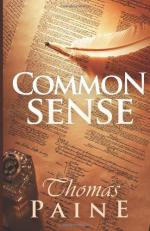Men of passive tempers look somewhat lightly over the offenses of Britain, and, still hoping for the best, are apt to call out, “Come, come, we shall be friends again, for all this.” But examine the passions and feelings of mankind, Bring the doctrine of reconciliation to the touchstone of nature, and then tell me, whether you can hereafter love, honor, and faithfully serve the power that hath carried fire and sword into your land? If you cannot do all these, then are you only deceiving yourselves, and by your delay bringing ruin upon posterity. Your future connection with Britain, whom you can neither love nor honor will be forced and unnatural, and being formed only on the plan of present convenience, will in a little time fall into a relapse more wretched than the first. But if you say, you can still pass the violations over, then I ask, Hath your house been burnt? Hath your property been destroyed before your face! Are your wife and children destitute of a bed to lie on, or bread to live on? Have you lost a parent or a child by their hands, and yourself the ruined and wretched survivor! If you have not, then are you not a judge of those who have. But if you have, and still can shake hands with the murderers, then are you unworthy of the name of husband, father, friend, or lover, and whatever may be your rank or title in life, you have the heart of a coward, and the spirit of a sycophant.
This is not inflaming or exaggerating matters, but trying them by those feelings and affections which nature justifies, and without which, we should be incapable of discharging the social duties of life, or enjoying the felicities of it. I mean not to exhibit horror for the purpose of provoking revenge, but to awaken us from fatal and unmanly slumbers, that we may pursue determinately some fixed object. It is not in the power of Britain or of Europe to conquer America, if she do not conquer herself by delay and timidity. The present winter is worth an age if rightly employed, but if lost or neglected, the whole continent will partake of the misfortune; and there is no punishment which that man will not deserve, be he who, or what, or where he will, that may be the means of sacrificing a season so precious and useful.
It is repugnant to reason, to the universal order of things, to all examples from former ages, to suppose, that this continent can longer remain subject to any external power. The most sanguine in Britain does not think so. The utmost stretch of human wisdom cannot, at this time, compass a plan short of separation, which can promise the continent even a year’s security. Reconciliation is now a fallacious dream. Nature hath deserted the connection, and Art cannot supply her place. For, as Milton wisely expresses, “never can true reconcilement grow, where wounds of deadly hate have pierced so deep.”




